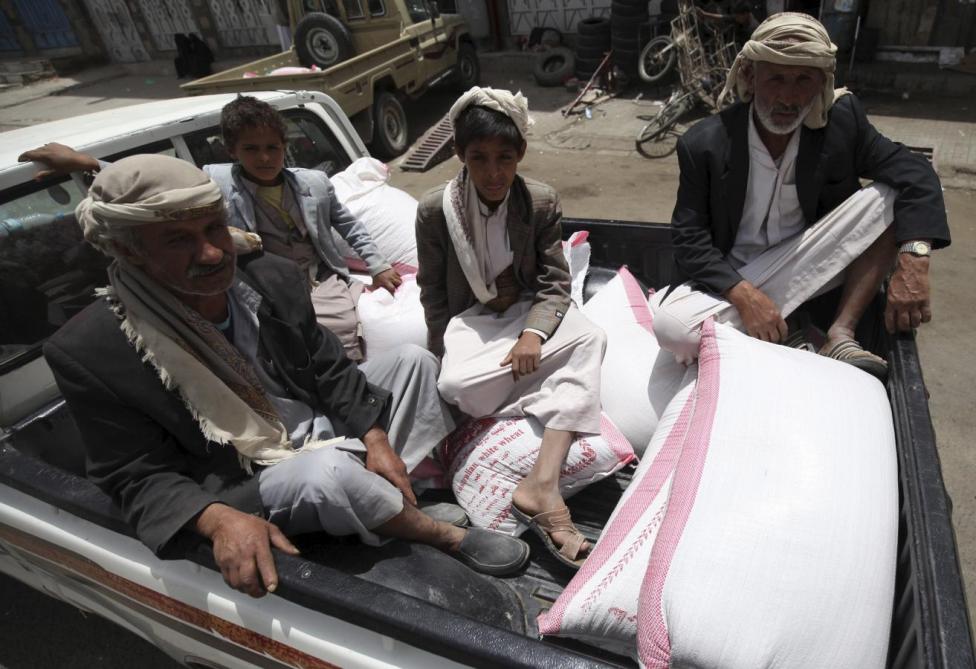Eden-The ongoing conflict in Yemen and the financial policies imposed by militias on the Central Bank in Sanaa, which is controlled by Houthis and Ali Abdullah Saleh’s forces, damaged the Yemeni Riyal and led to a rise in food and commodity prices, mostly during Ramadan.
This rise in prices comes in line with warnings issued by international organizations over the deteriorating humanitarian conditions in Yemen. The Food and Agriculture Organization (FAO) has said that around half of the country’s population is threatened by food scarcity.
In a briefing to the U.N. Security Council on the peace negotiations in Kuwait, Special Envoy for Yemen Ismail Ould Cheikh warned from the deteriorating economic situation in the country. His warning comes as Yemen witnesses a dangerous drop in living standards, in addition to its humanitarian disaster.
Observers said that prices of primary commodities like wheat, flour, sugar, rice, and others have increased by 30-40%.
Markets and malls in Eden and Sanaa witnessed an exceptional increase in the prices of imported food commodities. The same case was for local groceries during Ramadan, which caused a heavy burden for the majority of Yemeni families.
Citizen Ahmed al-Samahi said the soaring prices during the Holy month pushed people to skip the purchase of many commodities like meat and desserts.
The Saudi-led Arab Coalition has intervened in the Yemeni war since March 2015 to support the legitimacy represented by President Abd Rabuh Mansur Hadi, who has received an international support following the Houthis’ control over Sanaa by the end of 2014 and their advancement in Eden.
Clients in exchange companies said that the national currency began to lose more of its value as a result of the lack of hard currency. The owners of these companies have abstained from selling foreign currencies, citing lack of liquidity.
The Yemeni Central Bank, controlled by the Houthis since March 21, decided to fix the currency at around YER350 to the dollar compared to YER215 over the past years.
The residents of Eden blamed Hadi’s government for the rise in prices, saying monitoring and consumer protection agencies are not fulfilling their duties. They also expressed their disappointment with the government, which was expected to work on providing their basic needs, and to improve the city’s infrastructure following its liberation from the Houthis’ control and supporters of former President Saleh in July last year.
Residents of Sanaa said that they suffer from low income and lack of services and work opportunities because of what they described as the mismanagement of Houthis and their neglect for the different government institutions.
Analysts and economic observers said that merchants exploit the deterioration of the national currency and raise prices although they have stocks of basic commodities that could meet the people’s needs for six months or more. They added that merchants intentionally hid the commodities before Ramadan to manipulate the prices, deepening the humanitarian crisis in the country.
The Ministry of Industry and Trade announced that it has formed field teams to monitor the prices of some commodities. It added that field committees constantly follow up price control and pledge to punish manipulators.
The ministry expected consumer spending during Ramadan and Eid Al Fitr to reach USD1.5 billion.
Yemen is suffering from dire economic conditions since the Houthis grabbed power in September 2014, when oil exports representing 70% of the country’s revenues stopped, and when foreign aid, investments, and tourism revenues ceased to flow.
In a joint statement, FAO and the World Food Program said the country is suffering from one of the worst crises in the world.
Humanitarian Coordinator in Yemen Jamie McGoldrick said that 13.6 million Yemenis need urgent humanitarian relief aid amidst the deteriorating humanitarian conditions.
McGoldrick continued that the most urgent needs include food, security, and healthcare. He also warned that the Yemeni economy is approaching a total collapse.
